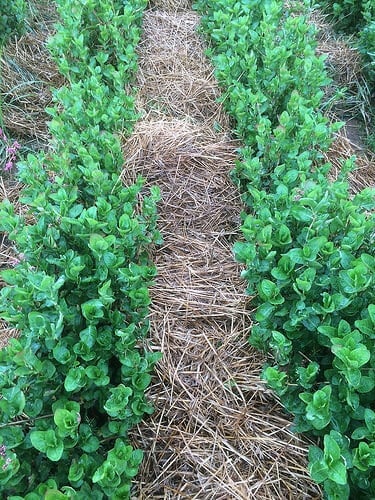Blue jeans are a classic symbol of American fashion, but did you ever wonder how your blue jeans got their color?
Synthetic indigo dyes are used to give jeans their hue, but that was not always the case. Only two countries, China and Germany, currently manufacture the dyes that are used to color jeans, with China producing 90 percent.
Synthetic indigo is derived from coal tar and toxic chemicals that are fused together under conditions so extreme that making it in the United States is cost prohibitive, due to strict environmental and safety regulations.
However, one American company is developing a natural indigo dye with the help of a $450,000 Small Business Innovation Research (SBIR) program Phase II grant from USDA’s National Institute of Food and Agriculture (NIFA).
Stony Creek Colors, located in Goodlettsville, Tenn., has found a more efficient way to produce natural indigo dyes using the indigo plant. The company’s goal is to replace 2.8 percent of synthetic indigo dye with natural dyes in the next five years. To achieve that, Stony Creek Colors will need to produce 15,000 acres of indigo here in the United States.
Almost all indigo dye produced is used in denim jeans. “Our novel methods for producing high purity plant-derived indigo allow it to be a direct replacement for synthetic indigo at American industrial denim mills,” said Sarah Bellos, Stony Creek Colors founder and CEO.
Synthetic indigo used in denim production pollutes waterways and is slow to decompose. When not treated properly, as is often the case in countries with lenient environmental regulations, it darkens river water; starving flora and fauna of sunlight and oxygen. The natural dye developed by Stony Creek Colors will not only benefit the environment, but farmers as well.
Small farmers can grow indigo as a cash crop – which is especially beneficial to Southeastern U.S. tobacco farmers who are looking for alternative crops to grow. The farmers plant the indigo and maintain the crops, while Stony Creek Colors harvests the crop and then processes and distributes the dye. The company has contracts with Tennessee farmers in Robertson, Davidson, and Montgomery counties as well as in Eastern Tennessee.
Stony Creek Colors sees farmers as the building block to America’s transition to a more bio-based economy.
“We started with indigo because in addition to providing an alternative-crop income in a specialized niche market, the crops are great beneficial insect attractors – and some of our varieties are nitrogen-fixing legumes that decrease overall synthetic nitrogen use,” said Bellos.
Stony Creek Colors also received a $100,000 SBIR Phase I grant for this project in 2013. The SBIR program offers competitively awarded grants to qualified small businesses to support high quality, advanced concepts research related to important scientific problems and opportunities in agriculture that could lead to significant public benefits.


